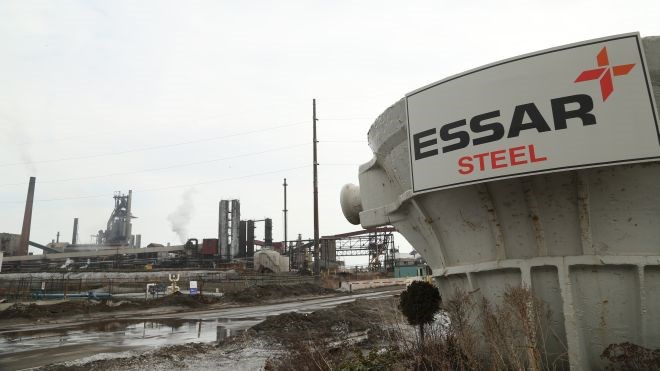For the first time in 18 months, Essar Steel Algoma is standing on its own two feet, without the safety net of the debtor-in-possession financing that's been in place since it first sought insolvency protection.
The US$255-million DIP financing arrangement expired May 1, but the Sault steelmaker says it needs to quickly replace it with another borrowing deal.
In the meantime, Essar Algoma is arguing that it would be "imprudent" to immediately pay its $25-million city tax bill in case steel prices continue to soften, because it needs $50 million to build its winter inventory, and because it's expecting its property tax bill to be slashed in an ongoing appeal.
Justice Frank Newbould of Ontario's Superior Court said that he had received a preliminary verbal report on Algoma's negotiations to renew or replace its DIP financing.
"I understand that the negotiating process is continuing with different potential DIP lenders," the judge said.
Newbould has ordered that a comprehensive, confidential analysis of the financing proposals be submitted to him by May 10.
Until he has weighed the proposals, the steel mill is prohibited from signing any new DIP commitment, the judge ordered.
In a sworn affidavit, Rajat Marwah, Essar Algoma's chief executive officer, pointed out that the company is appealing the assessed values of its Wallace Terrace site and other properties to Municipal Property Assessment Corp.
Algoma was recently advised that the assessed value of the Wallace Terrace site has been reduced to $39.8 million for the 2017 to 2020 tax years, from the original assessment of $83 million.
"In light of the notice, Algoma is confident in a successful assessment appeal for the 2014 to 2016 tax years," Marwah said.
The steel mill hasn't made regular property tax payments to the city since Apr. 16, 2014.
"The city is one of only 18 municipalities in Ontario with a large industrial tax rate, and it is the highest industrial tax rate in Ontario of municipalities with a population over 5,000," Marwah said.
"In the circumstances, it would be imprudent to make payments on account of property taxes during the CCAA (Companies' Creditors Arrangement Act) proceedings in light of the recently received notice and while the assessment appeal is pending, which could reduce the amounts owing to the city historically by up to 50 per cent," he said.
A company the size of Essar Steel Algoma needs a minimal cushion of $20 million in available cash to operate, and the court-appointed monitor is recommending $25 to $30 million.
A change of $10 per tonne in the price of steel has an impact of $20 million to $25 million on Essar Algoma's cash position.
"There is no certainty with respect to how long current pricing will last and the company is only a few months from another winter build, which can only be funded through additional DIP financing," Marwah said.
"(Essar Algoma)'s ability to continue operations beyond the next few months depends on the availability of DIP financing."
The company is expecting a revenue decrease of $60 million and $25 million in lost profits later this year when it rebuilds one of the four stoves that supply hot air to the No. 7 blast furnace.
"The stoves have not been updated since their original installation on the site over 30 years ago," Marwah said. "The stove rebuild is to take place between July 2017 and November 2017....Algoma's steel production will be reduced by approximately 78,000 tons during this period."
Each year, Essar starts in November to accumulate inventories of coal and iron ore to continue operations during the winter freeze-up from January through March.
"It is currently estimated that the 2017 winter build will cost approximately $50 million," Marwah said. "Any payments Algoma is required to make to the city will reduce the amount of cash available to Algoma for the purposes of the winter build and increase the financial pressure on Algoma to source alternative funding for that purpose."




